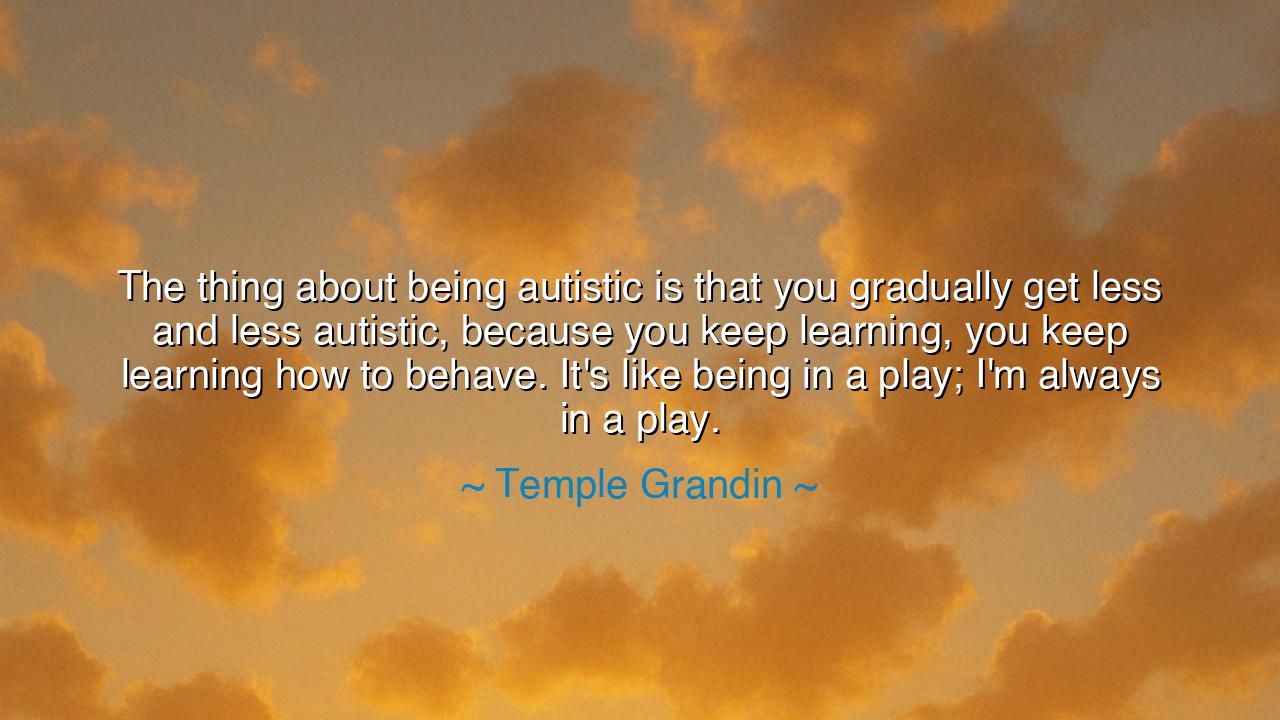
The thing about being autistic is that you gradually get less and
The thing about being autistic is that you gradually get less and less autistic, because you keep learning, you keep learning how to behave. It's like being in a play; I'm always in a play.






“The thing about being autistic is that you gradually get less and less autistic, because you keep learning, you keep learning how to behave. It’s like being in a play; I’m always in a play.” – Temple Grandin
In these deeply human and luminous words, Temple Grandin, the renowned scientist, engineer, and advocate for neurodiverse minds, unveils the essence of a lifelong journey — the journey of learning, adaptation, and self-awareness. Her words are not a lament, but a revelation — that growth, even when born from struggle, can become a form of artistry. To her, life itself is a stage, and every interaction, every observation, every new act of understanding, is a step toward mastery. Yet beneath her humility lies something greater: the truth that those who must learn consciously what others take for granted often acquire a depth of perception unknown to the rest.
The origin of this quote springs from Temple Grandin’s own extraordinary life. Born in 1947, at a time when autism was scarcely understood and often misdiagnosed, she faced immense challenges in communication and social understanding. Doctors once advised her parents to institutionalize her — yet her mother refused, choosing instead to teach, nurture, and believe. Through relentless effort and the power of curiosity, Grandin learned to interpret the social world around her. Every gesture, every tone, every expression became a study. Over time, she built bridges between her own way of seeing and the world’s expectations — not to lose herself, but to learn how to be understood.
When she says, “It’s like being in a play; I’m always in a play,” she speaks of the conscious performance that many neurodivergent souls must undertake to navigate a world not made for them. But she speaks it without bitterness. Rather, she reveals the courage in that constant effort — the discipline of awareness, the vigilance of empathy. Her life becomes a metaphor for all who struggle to belong: that to live mindfully, to study human nature and learn its rhythms, is a sacred act of both strength and intelligence. To “act” in this way is not to be false; it is to be brave enough to learn what others never have to question.
In the ancient world, philosophers like Aristotle believed that virtue itself was learned through repetition, through the steady practice of right action. One does not wake up wise; one becomes wise through the performance of wisdom until it becomes real. So too does Temple Grandin’s “play” reveal something universal — that all of us, in some way, are actors on the stage of life, striving to embody understanding, patience, and compassion. The difference is that those like Grandin perform this play with full awareness, consciously sculpting each gesture of humanity. They teach us, by example, the beauty of intentional growth.
Her words also remind us that learning never ends. She says, “You keep learning, you keep learning how to behave,” and within that repetition is the pulse of evolution itself. Life is not static; it is the constant act of becoming. What we learn — about ourselves, about others, about the world — reshapes who we are. In this, Grandin’s wisdom transcends autism and speaks to all humankind: that living well means continually studying how to love, how to listen, how to exist in harmony. Even the so-called “normal” must keep learning how to be human, for understanding is a lifetime’s labor.
Consider the story of Helen Keller, who, like Grandin, faced the vast silence between inner life and outer world. Through the tireless teaching of Anne Sullivan, she learned not only to communicate, but to feel the soul of others through touch and empathy. Helen once said that her darkness taught her to “see with the heart.” Temple Grandin’s journey mirrors that same sacred process — transforming what was once isolation into insight, turning difference into gift. Both women reveal that limitation, when met with courage and learning, can become a doorway to transcendence.
The lesson, then, is this: to live is to learn, and to learn is to become. Whether one is autistic, introverted, wounded, or simply human, the path toward wholeness is forged through awareness. Learn how to listen; learn how to see; learn how to love — not as instinct, but as art. Accept that you, too, are “in a play,” and that your role, no matter how challenging, can be performed with grace and truth. What matters is not perfection, but participation — not pretending, but the courage to keep trying, every day, to understand more deeply.
For in the end, Temple Grandin teaches us that learning is the soul’s great rehearsal for wisdom. We are all actors on the world’s stage, and through our struggles, we refine our performance until it becomes reality. Her life stands as a hymn to perseverance and awareness — a reminder that every act of learning is an act of liberation. So keep learning, keep growing, and play your part well — for in the theater of life, the greatest art is the art of becoming fully human.






AAdministratorAdministrator
Welcome, honored guests. Please leave a comment, we will respond soon